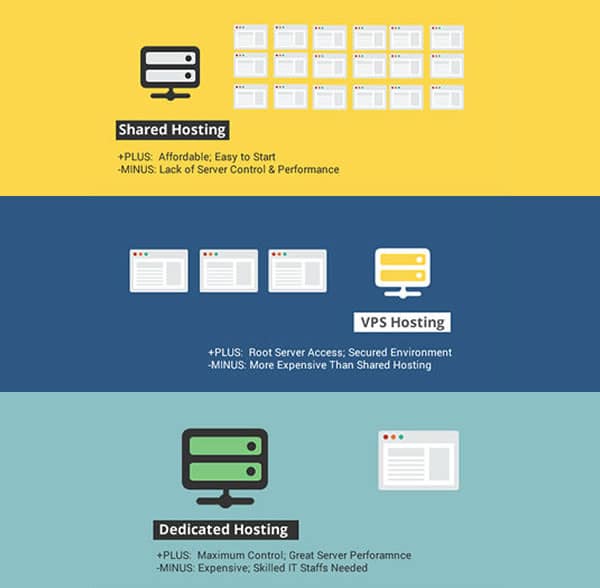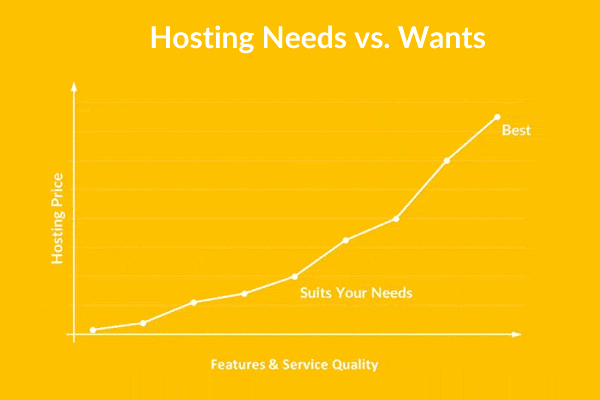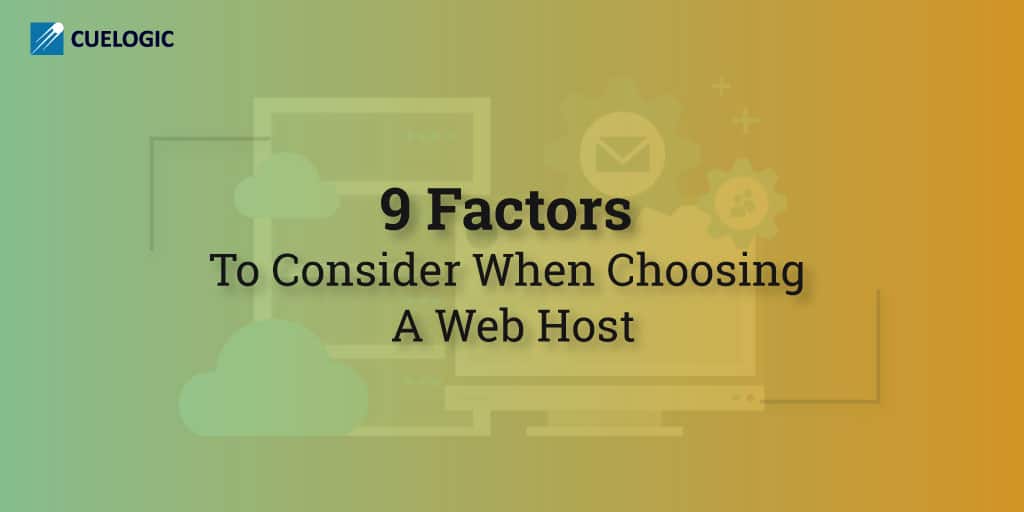Choosing a web host for your website is a big decision as it is an important foundation to ensure the success of your business. With the right web host, you can greatly improve and boost your website performance. Choose wrongly and you’ll end up causing all kinds of headaches as well as unnecessary expenses.
In this article, we’re going to explore some of the factors that you need to consider when choosing the right web hosting provider for your business.

1. Understand the needs of your site
A quick Google search will show you that there are tons of web host providers out there. But before you can even consider any of them, you need to know the needs of your website.
The first step towards choosing the right web host is to identify what your needs are for your website. Ask yourself questions such as “what type of website am I building?”, “Do I want to use WordPress?”, or “How much traffic am I expecting?”.
Now, these questions might seem basic, but are actually important.
Why?
Because the more detailed you can be, the easier it will be for deciding which hosting provider will be right for the job. Going for WordPress? Consider a managed WordPress hosting provider. Building an online store? Look at hosting providers that specialize in eCommerce.
If you’re a complete beginner, here’s a quick tip:
Always go for a shared hosting plan with a trusted company.
Since shared hosting is cheap and easy to maintain, they are the perfect choice for new and smaller sites. Plus, they free you from worrying about backend issues such as maintenance and security and lets you focus on building your website.
2. Look at server reliability/uptime scores
When Amazon went down for 30 minutes in 2013, it cost them $66,240 per minute in revenue.
Suffice to say, staying online is very important for your website and in order to do that, you need to look at how stable your web host provider is.
Now, there are plenty of server monitoring tools that you can use to track a web host but generally, a look at their uptime scores is more than enough to tell whether a web host is stable or not.
The industry standard today at 99.95% uptime and anything below 99% should be avoided. Of course, premium accounts will offer better server stability with some managing 99.99% uptimes or even better.

3. The ability to upgrade your server
Hosting plans come in all shapes and sizes today but if you’re just starting out, odds are you’ll end up with a shared hosting plan.
If you do, then it’s recommended that you choose a provider that allows you to upgrade your server down the road.
The reason being, even if you opt for a really good shared hosting plan, there’s still a limit to the resources you have available. Once your website grows bigger and attracts larger traffic (above 30,000 unique visitors), then a shared hosting plan will not be enough to accommodate all that bandwidth.
A hosting provider that allows you to upgrade your plan will be a lot more useful than having to find a new host and migrating your entire website.
If you’re a beginner, here’s a quick tip:
A VPS or dedicated server plan offers greater server resources once your website outgrows the shared hosting plan. Be on the lookout for web hosts that offers the flexibility to scale up when your website demands it.
4. Research the signup and renewal price
There are 2 different prices that you need to know with web hosts – the signup price and the renewal price.
In most cases, what you pay initially for a plan might not be what you pay when you renew. More often than not, the renewal price will be significantly higher depending on how much offers/discounts you were given.
Unfortunately, it’s standard practice for hosting companies to hike up their renewal pricing and unless you intend to change your web host every 2 to 3 years, there’s no way to avoid it.
Instead, try to go for web hosts that are reasonable with their price jumps (nothing above 100%). For example, if the signup cost was $5/mo, then it shouldn’t go above $10/mo when you renew.
If you’re a beginner, here’s a quick tip:
Always take a look at the ToS of the web host on their policy for renewal rates. You can find their ToS usually at the homepage and a quick keyword search (renew or renewal) should help you find it.
5. Do they have a refund policy/free trial?
Using a web host can be a costly endeavour. Especially if you’re just starting out and don’t have a big budget to work with.
That’s why a hosting company that offers some form of refund policy and/or free trial period can greatly help reduce your costs.
With free trials, you can safely test out the hosting plan and opt out if it doesn’t fit your website’s needs. Should things go wrong, choosing a hosting provider with good refund policies will make sure that you don’t lose too much money.
There are some that charge a cancellation fee when you cancel your account during their trial periods. Our best advice is to avoid these providers. Instead, go for companies that offer money-back guarantees with prorated refunds after your trial period is over.
6. Do they have the essential features?
While most hosting companies do offer all the basic necessities for a website, you should always check if they offer other essential features such as one-click installer, file manager, and DNS management.
One-click installer
A one-click installer is a great tool to help you install applications such as WordPress, Drupal, Joomla, etc in an easy manner. This is especially useful if you’re not good with the technical aspects of web creation.
.htaccess File Access
If you want to make site-wide administrative changes, you’ll to be able to access the .htaccess file. With it, you can edit and modify all sorts of parameters including password authentication and management.
FTP/SFTP Access
Most hosting provider will offer some form of file manager which tends to be quite limited. With FTP/SFTP access, you will be able to handle and move large amounts of files on server safely.
If you’re a beginner, here’s a quick tip:
You should ignore Disk Space and Data Transfer Capacity when you’re just starting out.
Most shared hosting plans offer server resources (RAM and processing power) that’s more than enough for smaller websites. But when it comes to storage and bandwidth, you can easily use third-party platforms such as Imgur, YouTube, Google Doc, to handle your images, videos, and documents
7. Having backups for your site
Backups are essential for a website. Even with all the security measures in the world, your website will face some kind of crash, failure, virus, or hack that will take your website down, or worse, nuke it entirely.
That’s where a good backup policy comes in handy because you can always revert back to a working website should an accident happens.
A good web host provider should be able to restore your full site (or at least a huge chunk of it) with very minimal downtime to avoid any significant losses.
Some of the key questions that you might want to ask your web host about backups include:
- Do they conduct regular full backups?
- Can you manually backup your site via the control panel?
- Can you use programs to create auto backups of your site?
- Can you restore the backup files yourself or do you need the support staff to do it?
8. The quality of customer support (live chat or telephone)
There will be times when you’re faced with a server issue that you just can’t solve by yourself. This where a good customer support team will be essential.
Ideally, you would want to settle with a hosting provider that gives you good and responsive support either via live chat or telephone. That way, you can immediately resolve your website issues.
Research on a hosting provider’s support team reviews either on social media platforms such as Facebook or on forums to get a better idea of the quality of their support team.
9. Quick server responsiveness and speed
With Google now taking mobile page loading speed in consideration for their rankings, it’s clear that having a fast loading page is important for your website and business.
It’s recommended that you go for hosting providers that can offer you a stable and fast server speed to ensure that your website loads fast and smoothly. This will not only improve the overall user experience but will also help your SEO rankings as well.
Check on a web host’s speed and server responsiveness by testing their Time To First Byte (TTFB), using tools such as Bitcatcha and WebpageTest.
In Summary
When choosing a hosting company, take your time and weigh all the options. You can save a lot of tie and trouble if you just be more mindful on how you choose your web hosting provider.
Just keep the following factors in mind before when you look for a web host:
- Your website needs
- Their uptime scores/server reliability
- How flexible are their plans
- The signup and renewal pricing
- Their refund policy/free trials
- What features they offer
- Backups for your website
- Quality of customer support
- Server speed and responsiveness
While there are many more factors when comes to choosing a web host, the ones we’ve listed above should help you greatly in deciding on the right hosting provider for your business and your website.
